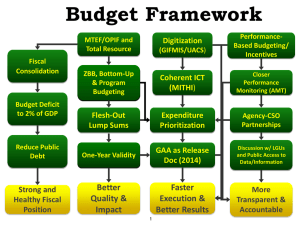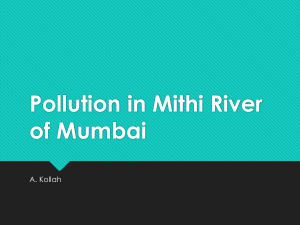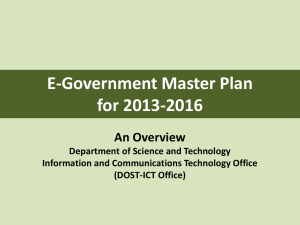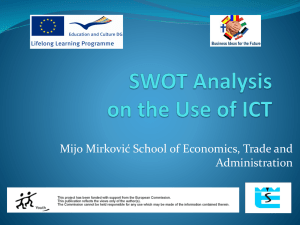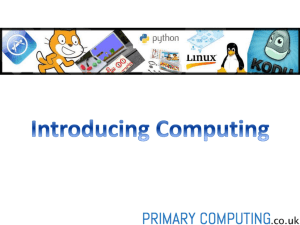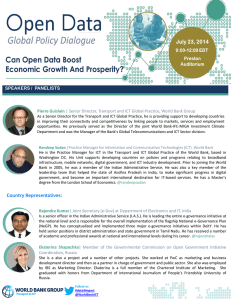MITHI Overview - Department of Budget and Management
advertisement
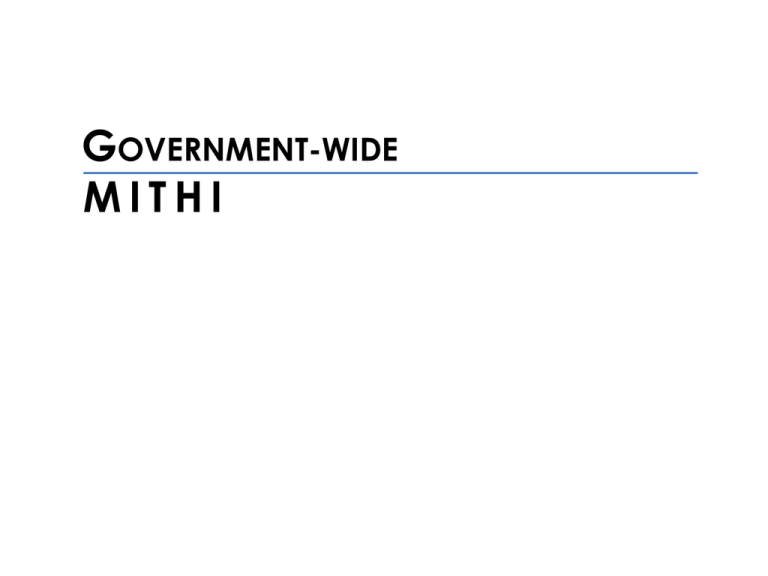
TERM IONS OGY TION ATIVE GOVERNMENT-WIDE MITHI BACKGROUND AND RATIONALE: MITHI MEDIUM-TERM INFORMATION AND COMMUNICATIONS GOVERNMENT INFORMATION SYSTEMSINITIATIVE PLAN TECHNOLOGY (ICT) HARMONIZATION • •Issued EO 265 July, 2000 MITHIthrough is a process thatonwill help the E-Gov Master Plan •Framework guide for computerization of ICT needs, (EGMP) withand a bottom-up perspective of their key frontline andbe common servicesfor and which shall then "harmonized" inclusion into the operations of the government EGMP. FINAL OUTPUT: Updated E-GOVERNMENT MASTER PLAN E-GOVERNMENT MASTER PLAN • Singular authoritative strategic blue print for Philippine E-Governance. • Currently being formulated by DOST-ICTO; intended to update the GISP. M To ensure the coherence of ICT programs and projects of the ITHIIN: Government and its consistency with the five (5) Key Result Areas (KRA) of the Administration as laid out in EO no. 43 and the Philippine Development Plan 2011-2016. To ensure a systematic process for the planning, budgeting, implementation, monitoring, and evaluation of government-wide ICT projects. BENEFITS OF MITHI: Coordinated ICT Programs and Projects Enable bureaucracy to take advantage of: VARIOUS SYNERGIES ECONOMIES OF SCALE IMPROVE THE PHILIPPINES’ GLOBAL COMPETITIVENESS RANKING LEAD AGENCIES: ADVISORY MEMBERS: PARTICIPATING AGENCIES: Comprised of all Departments, Agencies, State Universities And Colleges (SUCs), Government-owned Or-Controlled Corporations (GOCCs), The Congress, And Constitutional Fiscal Autonomy Group (CFAG). BENEFITS OF FAITHFUL PARTICIPATION ICT programs and projects that were approved under the auspices of MITHI shall be considered as evaluated and endorsed by recognized technically proficient government stakeholders, which: Will facilitate ERB examination by the DBM. May be considered sufficient compliance to ISSP by the DOST May be deemed equivalent to docs required for NEDA-ICC review (as applicable). BENEFITS OF FAITHFUL PARTICIPATION Programs and projects requiring review and endorsement of other agencies (e.g. NEDA-ICC), shall undergo existing processes. EFFECT OF NON-PARTICIPATION • Resources, programs, and projects that are not processed through the methods and venues prescribed by this Circular and subsequent pertinent issuances related to MITHI may not be accorded funding. STEERING COMMITTEE FUNCTIONS: Facilitating the compilation of an inventory of existing, ongoing and proposed requisitions of ICT-related resources and ICT-related programs and projects. Formulating standards for the evaluation, monitoring, and review of the ICT-related programs and projects Finalizing the Strategic Three-Year e-Government Master Plan MITHI PROCESS der Engagement ticipation of civil so that a multiurces, programs agencies and aft their agency Stakeholder Engagement ated resources, posed), among tion of agency be subject to ng Committee. Stakeholder Engagement ed as evaluated eholders. Stakeholder Engagement MITHI Steering dget proposals ame processes Stakeholder Engagement Stakeholder Engagement to make OTHER RELEVANT INFORMATION • Programs and projects requiring NEDA Investment Coordination Committee (ICC) review and endorsement, and other similar processes requiring the review and endorsement of other agencies, shall undergo existing processes. •The ISSP as required for submission to the DOST shall continue to be mandatory, except that the DOST may consider participation in MITHI and the corollary submissions as sufficient compliance with the requirement. CRITERIA FOR SELECTING ICT PROGRAMS AND PROJECTS SOCIAL CONTRACT (5 KRAs) NECESSARY FOR THE DEPARTMENT’S OPERATIONS E-GOVERNMENT MASTER PLAN PHILIPPINE DEVELOPMENT PLAN 2011-2016 INDICATIVE TIMELINE: Period Covered Activity Output/s Submission of Survey Forms; gathering Accomplished December 28 information on existing ICT resources and on- Forms going ICT programs and projects Inventory of Existing and Collation, capture, and processing of Ongoing ICTsubmissions January 2 related Resources and Programs and Projects 1st Plenary • MITHI Overview • History, Background, Rationale, VisionJanuary 15-18, mission of the eGMP • Presentation of the Budget Process vis-à-vis 2013 MITHI process • Presentation of the Proposal Template (ICT Project Checklist and MITHI Concept Paper) Actor/s Participating Agencies DOST-ICTO Participating Agencies, ConvenorAgencies INDICATIVE TIMELINE: Period Covered Feb 1, 2013 Feb 8, 2013 Activity Output/s Actor/s Submission of ICT Project Checklist and MITHI Concept Paper for projects that cost Php 10 million and below ICT Project Checklist Participating MITHI Concept Paper Agencies Submission of ICT Project Checklist and Project Concept Plan for projects that cost Php 10 million and above Feb11 - 22, 2013 Collation, capture, and processing/assessment of submissions Tentative: Mar. 5-6, 2013 2nd Plenary • Brief Review of EGMP • Review of Criteria for Evaluating Proposed Projects • Harmonization and Integration of Programs and Projects per Cluster List of Proposed ICTrelated Resources DOST-ICTO and Programs and Projects Participating Agencies, Convenor-Agencies INDICATIVE TIMELINE: Period Covered Activity Mar, 2nd week Updating of the EGMP in light of to Mar, 3rd information gleaned and decisions made week through MITHI Mar 25, 2013 Output/s Updated EGMP Actor/s Steering Committee and Secretariat Final MITHI Output Steering Committee ICT associations Secretariat Participating Agencies Finalization of MITHI plenary outputs Detailed Work and Financial Plans, Implementation Plans, etc. April 1st to 2nd week Preparation of docs for Budget Proposal in light of the Final EGMP April 15, 2013 Agency Budget Submission to DBM of Agency Budget Proposals Proposals (including the approved ICTrelated resources and plans and projects) Participating Agencies
